As a Jack Russell parent, you want nothing but the best for your furry friend. That’s why you probably want to learn how to spot potential health problems that could affect your pal, no matter if they’re a sprightly youngster or a wise senior.
After all, some conditions can strike JRs at any life stage, so it pays to be informed.
In this article, we’ll cover the 22 most common health problems in Jack Russells. Some are more typical as pups age, while others can sneak up at any point.
The key is knowing what to look out for and understanding that every puppy is different. So, use this guide only as a starting point, and work with your vet to tailor your approach to your buddy’s unique needs.
Skin Issues
Skin issues are one of the most common health problems in Jack Russells because they don’t have a lot of fur. This makes them more susceptible to a range of skin problems, including atopic dermatitis and skin cancer.
#1: Atopic Dermatitis

A
Jack Russell
with dermatitis.
©Reshetnikov_art/Shutterstock.com
JRs tend to be especially vulnerable to a pesky condition known as atopic dermatitis or eczema. Unlike many other types of dermatitis, eczema is a chronic, long-lasting disease with often unknown causes.
The good news is that eczema is not contagious – but symptoms can be pretty hard to live with for your puppy. They can include:
- Itchiness and scratching
- Hair loss
- Red skin and rashes
- Repeated ear infections
Treatment may include steroid creams, oral medications, omega-3 fatty acid supplements, and avoidance of triggers. While not curable, atopic dermatitis can often be managed with a combination of treatments and lifestyle changes, and sometimes goes away with age.
#2: Skin Cancer

Jack Russells’ light coat can be problematic.
©Liudmila Bohush/Shutterstock.com
Skin cancer is another common concern with Jack Russells. Their light coat and fair skin make them prone to developing mast cell tumors, a type of cancer that forms from their mast cells.
Unfortunately, it can be very difficult to tell mast cell tumors from other, benign kinds of skin lumps and lesions. They also don’t have to be accompanied by any other symptoms, so it’s best to let your vet check any suspicious skin bumps.
When there are other symptoms, they can include:
- Scratching and biting of the skin lump
- Bloody stool
- Decreased appetite
- Vomiting and diarrhea
Treatment depends on the size, location, and aggressiveness of the tumor, and may involve surgery, radiation, chemotherapy, and/or steroids. The sooner you detect and remove tumors in your pet, the better the chance of successful treatment and long-term remission.
Dental Problems
Our active little companions are also more prone to dental issues than larger dog breeds.
#3: Gum Disease
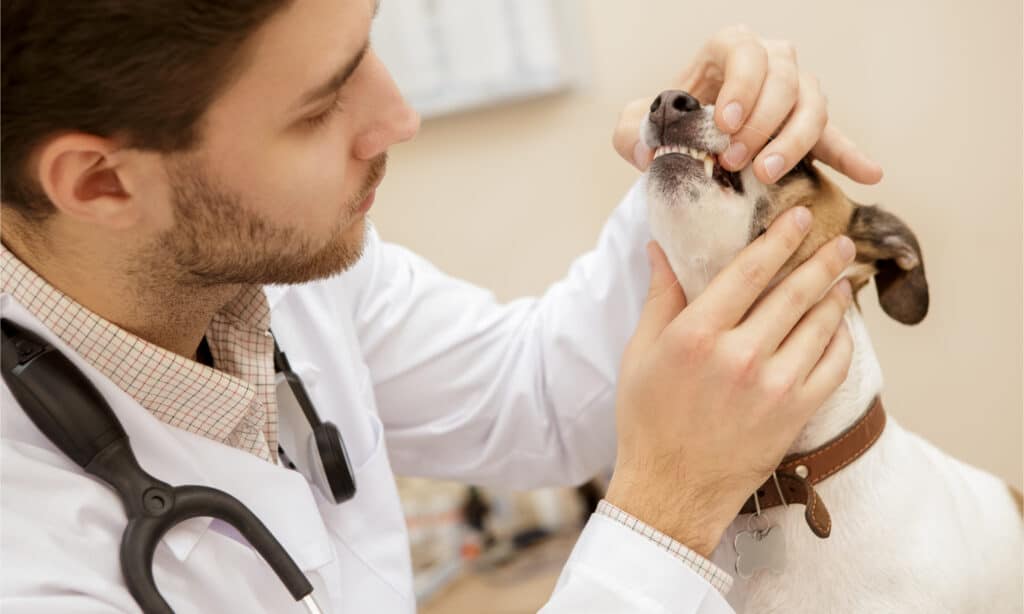
Regular vet checkups can prevent gum disease.
©Nestor Rizhniak/Shutterstock.com
Gum disease is quite common in JRs. Symptoms can develop gradually and include:
- Bad breath
- Red, swollen, or bleeding gums
- Loss of appetite
- Loose or discolored teeth
Treatment involves professional cleanings to remove plaque and tartar buildup and surgery.
You may also need to adapt your puppy’s diet, switching from hard to softer foods that are easier to chew and digest. And if you want to make them really healthy and happy, reward them with specialized dental chews and treats.
#4: Dental and Mouth Abnormalities

Jack Russells can also struggle with teeth and jaw abnormalities.
©Bonsales/Shutterstock.com
Some Jack Russells are also prone to dental and jaw abnormalities, such as:
- Malocclusion (overbite or underbite)
- Misaligned, missing, or extra teeth
- Overshot jaw (upper jaw longer than the lower jaw)
- Undershot jaw (upper jaw shorter than the lower jaw)
Such abnormalities can cause drooling, difficulty eating, and pain. On the bright side, they’re usually not very serious or life-threatening.
Treatment options are also mainly more lightweight and include tooth extraction, dental adjustments, or orthodontic appliances. Surgery may be needed in more severe cases.
Sensory Decline
Senses like sight, hearing, and scent can, sadly, also decline with age and cause issues for our four-legged friends. Here are some common sensory problems to watch out for.
#5: Glaucoma

Glaucoma can lead to eye loss if left untreated.
©Stephen William Robinson/Shutterstock.com
Glaucoma is a buildup of eye pressure that can damage the optic nerve.
It’s caused by inadequate drainage of the fluid inside the eyeball, and the symptoms in dogs include:
- Redness
- Cloudy eyes
- Dilated pupils
- Eye pain and sensitivity to light (may be indicated by squinting or excessive blinking)
Your vet can easily check your doggo’s eye pressure levels using a tonometer, so make sure to pay them a visit if you notice any concerning symptoms. If left untreated, glaucoma can lead to vision loss, blindness, and even eye loss.
Treatment can range from eye drops and oral medications to laser surgery.
#6: Cataracts
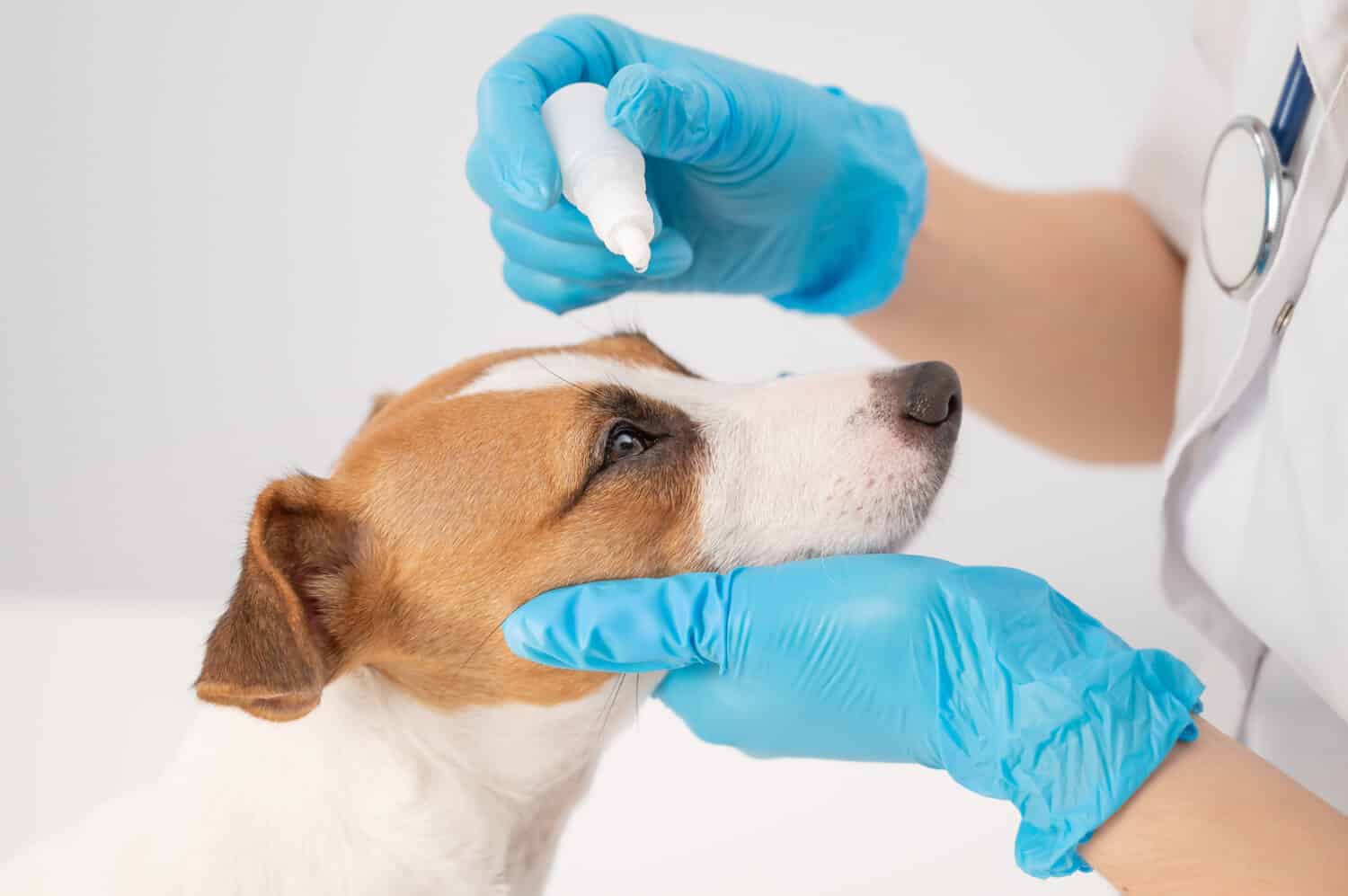
Surgery is the standard treatment for cataracts, but eye drop medication is slowly emerging as a viable alternative.
©Reshetnikov_art/Shutterstock.com
Cataracts occur when the lens of the eye becomes cloudy and starts blocking light. While glaucoma affects the optic nerve, cataracts affect the lens.
Symptoms of cataracts in JRs include:
- Changes in pupils (for example, one pupil can become larger than the other)
- Loss of vision (indicated by disorientation, bumping into furniture, or reluctance to move)
- Sensitivity to light / not responding to light
- Red, irritated eyes
- Continual blinking or squinting
Treatment often involves surgery that removes the cataractous lens and puts an intraocular lens implant in its place. With proper post-op care, this procedure can restore vision in most puppers.
Pro tip: Try to address the cataracts head-on as soon as you notice a problem. Older cataracts can be more difficult to remove.
#7: Primary Lens Luxation

Eye redness is a common symptom of lens luxation in dogs.
©Bonsales/Shutterstock.com
Primary lens luxation occurs when the lens of the dog’s eye shifts from its normal position. It is usually caused by a genetic defect in which the support ligaments of the lens weaken or break, further causing the lens to slip.
Lens luxation can be anterior or posterior, depending on whether the lens shifts forward or backward inside of the eye. Anterior lens luxation is considered more dangerous.
This condition is more common in terrier breeds and mainly affects them between 3-6 years of age. Common symptoms include:
- Difficulty seeing
- Pain (which may cause the dog to keep their eye(s) shut or squint)
- Redness of the white of the eye
- Watery discharge from the eye
Treatment options include medications, lens removal, or, in severe cases, eye removal.
#8: Hearing Loss

Hearing loss is common in aging dogs of all breeds, and JRs are no exception.
©eva_blanco/Shutterstock.com
Sadly, just like humans, dogs often experience hearing issues as they age. This can be frustrating and confusing for our furry friends, even if it’s not causing life-threatening issues.
The first signs of hearing loss include:
- Not responding when called
- Frequently barking for no reason
- Sensitivity or aggression toward loud noises
As hearing loss progresses, pups may become stressed, anxious, and extra sensitive toward environmental changes, such as rearranging furniture.
So, try to avoid making significant changes in their environment so as not to further confuse them. Also, try to make up for the lack of communication using hand signals.
#9: Ear Infections
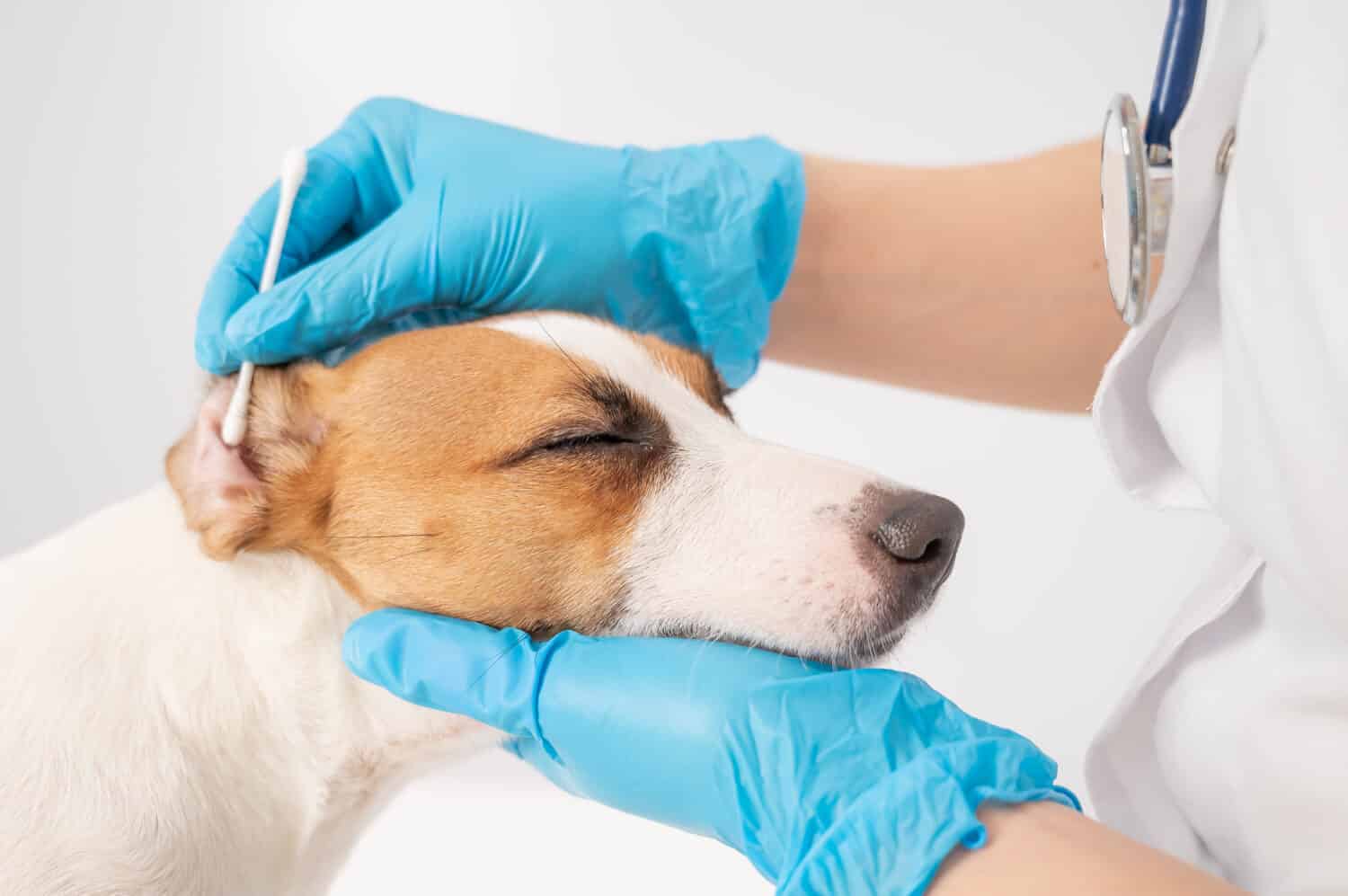
You can try cleaning your dog’s ears yourself using an ear stick. Be gentle.
©Reshetnikov_art/Shutterstock.com
Ear infections are incredibly common in JRs, especially in wet climates. Their floppy ears trap moisture, providing the perfect environment for bacteria.
However, as mentioned, ear infections can also sometimes be caused by atopic dermatitis or yeast instead of bacteria. Symptoms can include:
- Very noticeable and unusual shaking of the head
- Scratching at the ears
- Redness and swelling
- Foul-smelling discharge
- Loss of balance
Regular ear cleanings and frequent drying of the ears with a towel can help prevent infections. But, if you start noticing symptoms, visit your vet ASAP.
Treatment usually involves ear drops plus cleaning and flushing the ears. You can also consider supplementing your pupper’s diet with omega-3 fatty acids, as they help prevent inflammation.
Bone and Joint Issues
Some dogs are born with specific genetic bone and joint conditions. However, bone and joint health become even more important as our JR companions age. Here are a few common issues for this breed.
#10: Legg-Calvé-Perthes Disease

Excessive sitting can be a sign of bone or joint conditions like Perthes disease, especially in active breeds like Jack Russells.
©Chatuphon Nachanta/Shutterstock.com
Legg-Calvé-Perthes affects pups’ hip joints and is seen more often in smaller dog breeds like Jack Russells. Unlike most joint conditions, Perthes disease strikes dogs when they’re just a few months old.
It occurs when the blood supply to the ball of the femur is disrupted. This causes the boney tissues to degrade over time, leaving a painful hip joint.
These are some signs to watch for:
- Lameness in one or both hind legs
- Reluctance to exercise or climb stairs
- Sitting or lying down a lot
As the condition progresses, the symptoms may worsen and include pain, difficulty standing, walking, or jumping, and stiffness.
Treatment options may include pain medications, restricting activity, and, in some cases, hip replacement surgery.
#11: Hip and Elbow Dysplasia
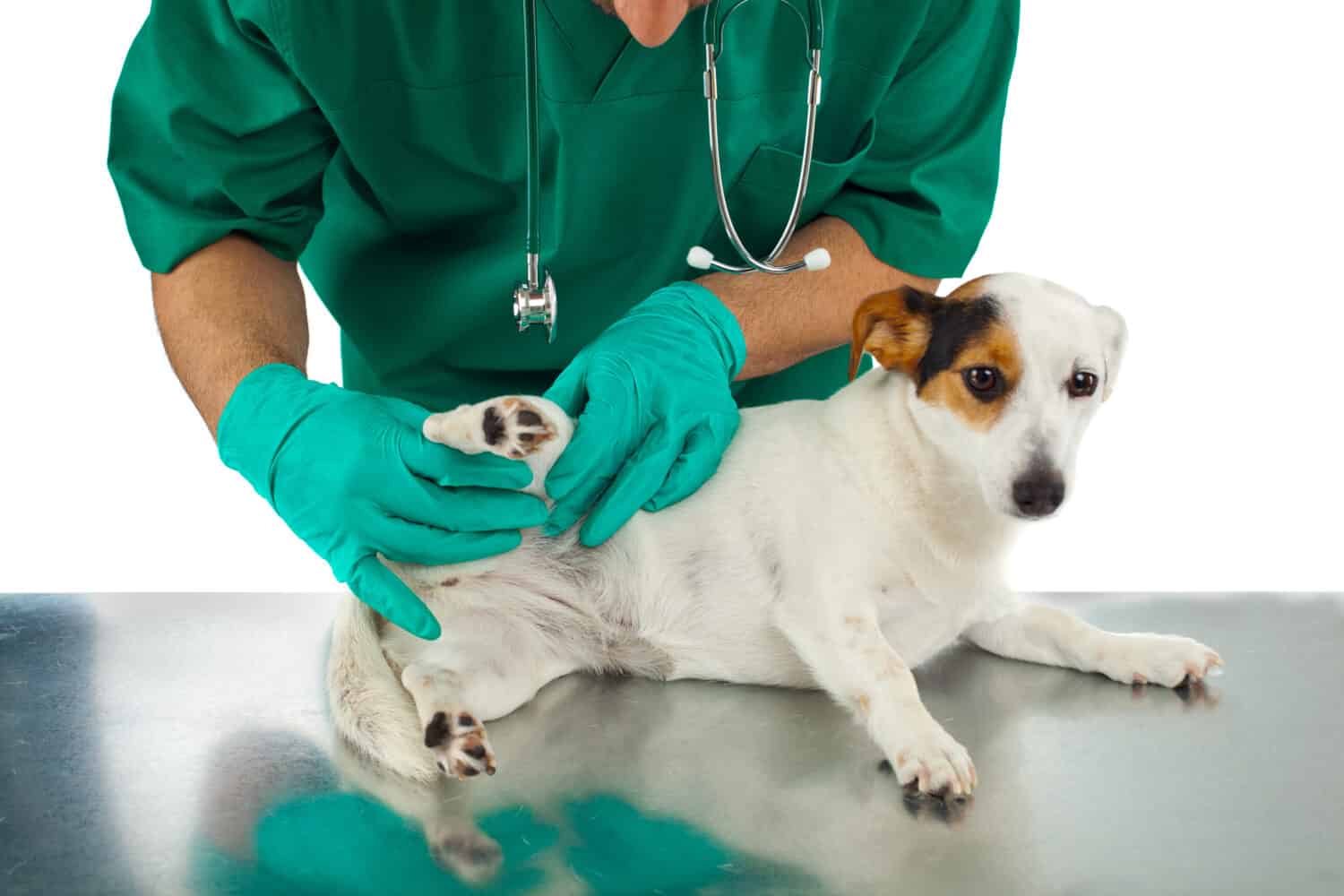
Hip and elbow dysplasia can also significantly slow down our energetic pals.
©Antonio Gravante/Shutterstock.com
Hip and elbow dysplasia are both common genetic conditions in JRs, occurring when the hips or elbows aren’t’ properly formed.
In hip dysplasia, the hip sockets are too shallow and the hip joint is not properly developed. In elbow dysplasia, it’s the elbow joint that’s abnormally developed.
The symptoms may include:
- Lameness or limping
- Trouble getting up
- Reluctance to exercise
- Lack of mobility
- Pain
The treatment can range from pain meds and weight control to physical therapy or surgery.
#12: Luxating Patella (Knee Dislocation)

Knee dislocation can cause problems with going up and down the stairs, as well as decrease overall mobility.
©Reshetnikov_art/Shutterstock.com
Luxating patella, or knee dislocation, happens when the kneecap slips out of place. It can be caused by trauma or genetics and is most commonly found in small breeds. Jack Russels are, unfortunately, no exception.
Most dog parents can identify luxating patella in their pets because the signs are, thankfully, pretty obvious. They include:
- Limping or hopping
- Trouble with stairs
- Reluctance to exercise
So, if you notice a loss of interest in activities and a lack of mobility in your pet, you may want to consider going to the vet. Treatment options may include leg braces, pain meds, physical rehab, and surgery.
Internal Organ and Blood Issues
Problems with internal organs and blood mostly affect aging Jack Russells but can occur in younger dogs, too.
#13: Cushing’s Disease

Weight gain can be a tell-tale sign of Cushing’s disease.
©Reshetnikov_art/Shutterstock.com
Cushing’s disease happens when the JR’s adrenal glands produce too much cortisol, which is often caused by a benign or malignant tumor in the pituitary gland.
Cushing’s can be dangerous for our faithful pals if left untreated. It weakens their immune system, leaves them more vulnerable to other diseases and infections, and may even cause kidney and liver damage or diabetes.
Signs can include:
- Excessive peeing, drinking, and eating
- Weight gain, especially around the neck and midsection
- Pot-bellied appearance
- Thin, fragile skin that bruises easily
- Hair loss
If you notice any of the above signs, do a vet check as soon as possible. Your vet should run blood or urine tests to check your pup’s cortisol levels and diagnose or rule out Cushing’s.
Treatment may involve medications that help lower cortisol, as well as removing the tumor if possible.
#14: Liver Issues

When combined with other symptoms, loss of appetite can indicate liver problems.
©alexei_tm/Shutterstock.com
Unfortunately, liver disease is quite common in senior Jack Russells – especially a liver disorder called portosystemic shunt (PSS). However, with the right meds, most dogs can live comfortably and well into their golden years despite these issues.
Signs of liver problems can include:
- Loss of appetite
- Weight loss
- Yellow skin or eyes (jaundice)
- Vomiting and diarrhea
- Excessive peeing and drinking
Treatment focuses on managing the symptoms, diagnosing and treating the cause, and, often, adjusting our pups’ diets and routines.
Common causes of liver issues include infections, endocrine diseases like Cushing’s, or cancer, so make sure to consult your vet on your pet’s condition.
#15: Heart Issues

Heart valve problems are especially common in smaller breeds.
©eva_blanco/Shutterstock.com
As Jack Russells age, their little hearts can start to give them trouble. They’re also prone to inherited conditions such as enlarged heart, arrhythmias, and especially pulmonic stenosis.
Pulmonic stenosis causes issues with the blood flow between our doggos’ hearts and lungs, which may further lead to the following symptoms:
- Murmur
- Difficulty breathing
- Loss of energy
- Collapsing or fainting
- Heart failure
Treatment options depend on the specific issue but will likely include medications, surgery, lifestyle changes, and regular vet checkups.
#16: Bladder Issues

Bladder issues are often indicated by frequent, but small-volume peeing.
©Martin Christopher Parker/Shutterstock.com
Bladder issues are more common in older JRs, and their urinary tract can become a struggle as they age.
Common problems include:
- Increased/more frequent peeing due to conditions like Cushing’s disease
- Incontinence (urine leakage caused by weak bladder muscles)
- Bladder infections caused by bacteria, certain meds, or diseases like diabetes
- Bladder stones (hard mineral deposits that form inside the bladder)
If your Jack Russell starts having frequent accidents, strains to urinate, or shows signs of pain while “in the toilet,” make sure to do a vet checkup. Treatment can include antibiotics, painkillers, hormone therapy, and other options depending on the root cause.
#17: Kidney Stones

Kidney stones can even cause depression in Jack Russells.
©Reshetnikov_art/Shutterstock.com
Stones can not only form in the bladder but also in the kidneys of our JR buddies.
Symptoms are similar to those caused by bladder stones:
- Straining to pee
- Urinating frequently in small amounts
- Blood in the urine
- Loss of appetite
- Depression
- Vomiting
Treatment options depend on the size and location of the stones but may involve pain meds, a special diet to dissolve small stones, or surgery to remove large stones that don’t pass on their own.
#18: Hemolytic Anemia and Thrombocytopenia

Blood issues often cause lethargy in dogs.
©Erik Lam/Shutterstock.com
Jack Russells can also develop diseases that affect their blood cells, the main ones being hemolytic anemia and thrombocytopenia.
- Hemolytic anemia is a pretty serious immune system condition in which the body destroys healthy red blood cells. It leads to lethargy, pale gums, disorientation, poor appetite, and overall weakness.
- Canine immune-mediated thrombocytopenia (ITP) is a disorder in which antiplatelet-specific antibodies destroy the dog’s platelets. It often leads to excessive or spontaneous bleeding, bruising, and lethargy.
If you have reason to suspect that your JR has either condition, make sure your vet runs all appropriate tests — especially a blood test.
Depending on the condition, the treatment can vary between symptom management, blood transfer, immunosuppressive therapy, steroids, and other available options.
Mental Well-Being Issues
Our Jack Russell companions rely on us to notice when their mental well-being starts slipping. We’ll discuss only the two most common mental health issues here but know that JRs may also experience others – such as anxiety, compulsive disorders like fly-snapping or light chasing, aggression, and cognitive decline.
#19: Epilepsy

Seizures are often followed by confused behavior.
©Iryna Kalamurza/Shutterstock.com
Our JR pals can develop epilepsy, or recurrent seizures, as they age.
Epilepsy occurs when electrical activity in our dogs’ brains malfunctions. Signs include:
- Collapsing suddenly
- Muscle twitching or jerking
- Loss of consciousness
- Confused behavior
- Disorientation
- Temporary blindness
Unfortunately, there is no cure for epilepsy in dogs. It’s a life-long condition, albeit one which with our puppers can still live comfortably if we take the necessary steps.
Dogs with epilepsy are usually treated with anti-epileptic drugs (AED), which help stop the over-excited brain cells that cause seizures.
We can also help our furry friends by identifying and minimizing the triggers. Although external influences don’t cause epilepsy, they can certainly trigger your dog into a seizure.
Pro tip: Keep a diary detailing when and how often seizures occur, how long they last, and what body parts they affect.
#20: Tail Chasing
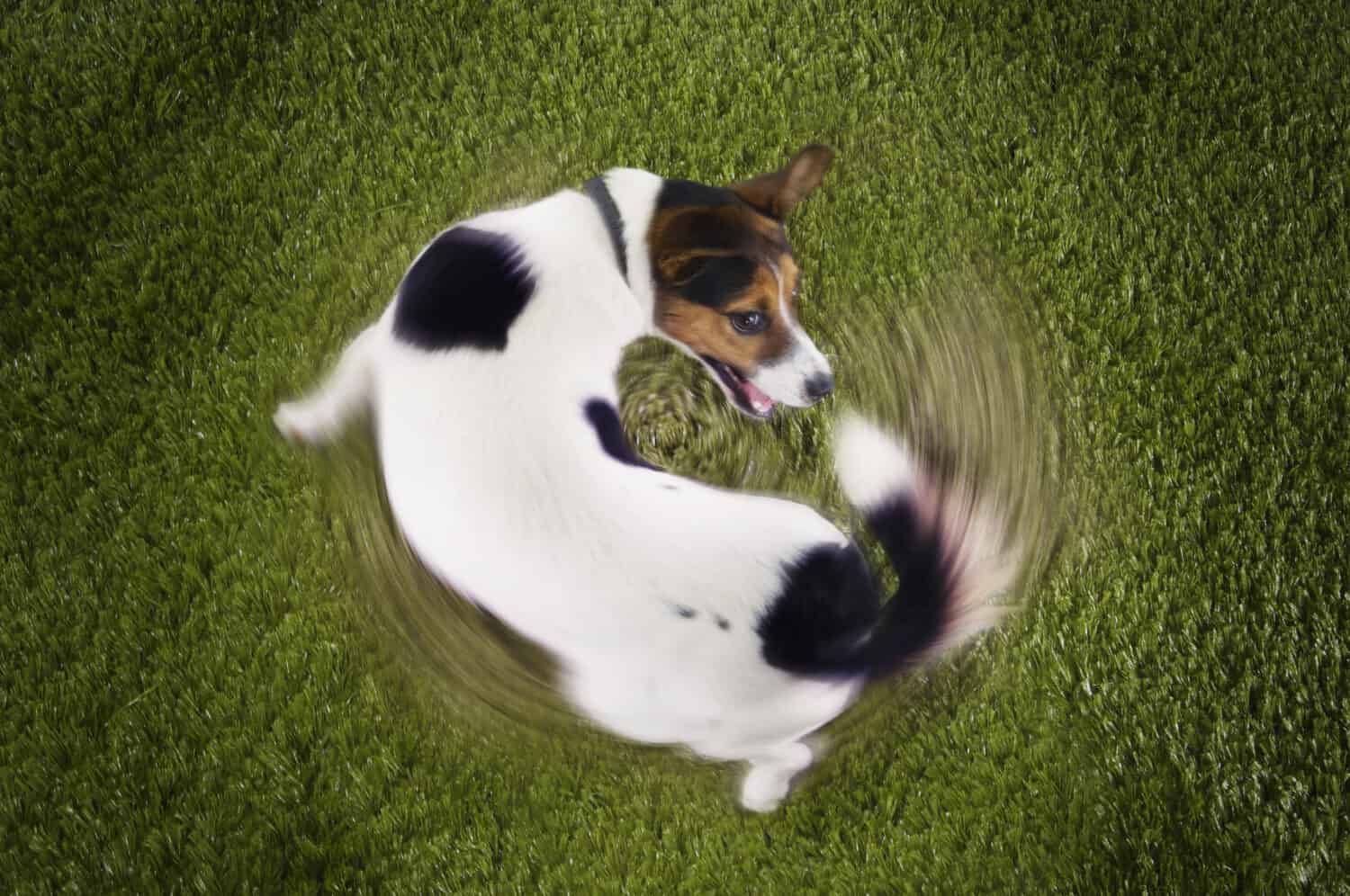
Tail chasing is, luckily, indicated by quite noticeable behavior.
©sirtravelalot/Shutterstock.com
Some Jack Russells repeatedly chase or bite at their own tail, sometimes for hours. This condition is called tail chasing and often stems from anxiety, OCD, or even brain changes.
Symptoms include:
- Excessive tail chewing/biting
- Repeated tail chasing
- Frustration or agitation
Treatment focuses on reducing your pup’s anxiety through medication, exercise, lifestyle changes, and, in severe cases, behavioral therapy.
Other Possible Issues
Let’s wrap up with a few other potential health issues.
#21: Obesity

It’s always important to choose healthy options for our furry friends.
©Reshetnikov_art/Shutterstock.com
Keeping weight off is especially important for senior Jack Russells with joint or organ problems. But even breeds as active as JRs slow down with age, making it easy for extra pounds to creep on.
Obesity can be much more risky than most people assume. Here are only a few problems it can cause in JRs:
- Joint pain from extra stress
- Arthritis
- Heart disease
- Diabetes
- Cancer
Treatment usually focuses on lowering the dog’s calorie intake, increasing their exercise, and incorporating specialized weight loss food in their diet.
#22: Hernia

Surgery is the only treatment option that can repair hernias.
©Javier Brosch/Shutterstock.com
Hernias occur when an organ pushes through a weakened muscle wall. They can be painful for our puppers, but are usually not life-threatening or too serious.
Symptoms of hernias include:
- A bulge or lump around the painful area
- Irritability when touched
- Difficulty walking
Treatment options include medications that help manage pain and swelling, as well as surgery – the only way to truly “repair” hernias.
The good news is that most JRs successfully avoid serious complications and easily recover from both hernia and their surgery.
So, How Can You Keep Your Jack Russell Healthy for Longer?
Now that we have gone over the most common health problems in Jack Russells, let’s explore how you can keep your doggo healthy for as long as possible.
- Exercise, exercise, exercise. Jack Russells need a minimum of one hour of exercise each day, not counting the playtime. Walking, running, swimming, and running up and down the stairs are all good options for these active puppers. Pro tip: If your Jack Russell is spending a lot of time indoors, make up for the lack of exercise with active playtime. Engage them in a game of tug and war, play a game of chase, or use lasers to make them run.
- Socialization. Jack Russells are, in general, very social creatures! Nurturing this part of them can have huge effects on both their mental and physical well-being, so try to plan play dates with other dog parents and pup pals as often as you can.
- Healthy diet and portion control. Feed your dog well — but not too much. Portion control is key to keeping your doggo at a healthy weight and living a long life.
- Mental stimulation. Jack Russells need jobs to do! Provide them with puzzles, activities, and training to give that big brain of theirs a workout. Besides keeping them healthy, this will also help minimize behaviors like chewing and barking.
- Routine veterinary check-ups. Take your doggo in for routine vet visits (and vaccinations, of course). The doc can catch any health issues early and keep your pup in tip-top shape for many years to come. Plus, your dog will feel more comfortable going to the vet’s if you do it regularly.
Summary of the 22 Most Common Health Problems in Jack Russells
| Health Problem Name | |
|---|---|
| #1 | Atopic Dermatitis |
| #2 | Skin Cancer |
| #3 | Gum Disease |
| #4 | Dental and Mouth Abnormalities |
| #5 | Glaucoma |
| #6 | Cataracts |
| #7 | Primary Lens Luxation |
| #8 | Hearing Loss |
| #9 | Ear Infections |
| #10 | Legg-Calvé-Perthes Disease |
| #11 | Hip and Elbow Dysplasia |
| #12 | Luxating Patella (Knee Dislocation) |
| #13 | Cushing’s Disease |
| #14 | Liver Issues |
| #15 | Heart Issues |
| #16 | Bladder Issues |
| #17 | Kidney Stones |
| #18 | Hemolytic Anemia and Thrombocytopenia |
| #19 | Epilepsy |
| #20 | Tail Chasing |
| #21 | Obesity |
| #22 | Hernia |
FAQs
What is the life expectancy of a Jack Russell?
The life expectancy of Jack Russells ranges, on average, between 13 and 16 years.
Do Jack Russells have a lot of health issues?
While all dogs can have health issues, Jack Russells in general tend to be a fairly healthy breed. Of course, regular vet checkups and a healthy lifestyle are key to keeping your furry companion happy and healthy for longer.
What age do Jack Russells slow down?
Most Jack Russells slow down in their teenage years. Signs like reduced mobility and stamina usually become especially more prominent around 12-14 years of age.
The photo featured at the top of this post is © alexei_tm/Shutterstock.com
Ready to discover the top 10 cutest dog breeds in the entire world?
How about the fastest dogs, the largest dogs and those that are -- quite frankly -- just the kindest dogs on the planet? Each day, AZ Animals sends out lists just like this to our thousands of email subscribers. And the best part? It's FREE. Join today by entering your email below.
Thank you for reading! Have some feedback for us? Contact the AZ Animals editorial team.






